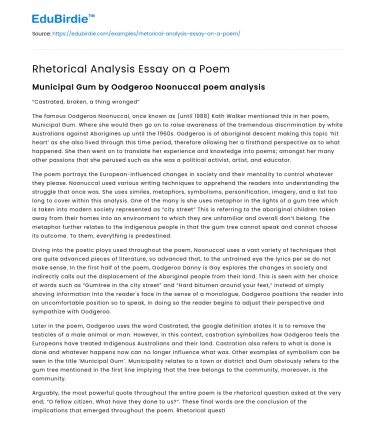Municipal Gum by Oodgeroo Noonuccal poem analysis
“Castrated, broken, a thing wronged”
The famous Oodgeroo Noonuccal, once known as (until 1988) Kath Walker mentioned this in her poem, Municipal Gum. Where she would then go on to raise awareness of the tremendous discrimination by white Australians against Aborigines up until the 1960s. Oodgeroo is of aboriginal descent making this topic ‘hit heart’ as she also lived through this time period, therefore allowing her a firsthand perspective as to what happened. She then went on to translate her experience and knowledge into poems; amongst her many other passions that she perused such as she was a political activist, artist, and educator.
Save your time!
We can take care of your essay
- Proper editing and formatting
- Free revision, title page, and bibliography
- Flexible prices and money-back guarantee
The poem portrays the European-influenced changes in society and their mentality to control whatever they please. Noonuccal used various writing techniques to apprehend the readers into understanding the struggle that once was. She uses similes, metaphors, symbolisms, personification, imagery, and a list too long to cover within this analysis. One of the many is she uses metaphor in the lights of a gum tree which is taken into modern society represented as “city street” This is referring to the aboriginal children taken away from their homes into an environment to which they are unfamiliar and overall don’t belong. The metaphor further relates to the indigenous people in that the gum tree cannot speak and cannot choose its outcome. To them, everything is predestined.
Diving into the poetic ploys used throughout the poem, Noonuccal uses a vast variety of techniques that are quite advanced pieces of literature, so advanced that, to the untrained eye the lyrics per se do not make sense. In the first half of the poem, Oodgeroo Danny is Gay explores the changes in society and indirectly calls out the displacement of the Aboriginal people from their land. This is seen with her choice of words such as “Gumtree in the city street” and “Hard bitumen around your feet,” Instead of simply shoving information into the reader's face in the sense of a monologue, Oodgeroo positions the reader into an uncomfortable position so to speak, in doing so the reader begins to adjust their perspective and sympathize with Oodgeroo.
Later in the poem, Oodgeroo uses the word Castrated, the google definition states it is to remove the testicles of a male animal or man. However, in this context, castration symbolizes how Oodgeroo feels the Europeans have treated Indigenous Australians and their land. Castration also refers to what is done is done and whatever happens now can no longer influence what was. Other examples of symbolism can be seen in the title ‘Municipal Gum’. Municipality relates to a town or district and Gum obviously refers to the gum tree mentioned in the first line implying that the tree belongs to the community, moreover, is the community.
Arguably, the most powerful quote throughout the entire poem is the rhetorical question asked at the very end; “O fellow citizen, What have they done to us?”. These final words are the conclusion of the implications that emerged throughout the poem. Rhetorical questions are used to provoke thought and to stimulate a pre-determined response. In addition to this, Oodgeroo uses this method to involve the reader not only with asking the question but also with selecting the word us as the final word. Moreover, if the reader is following the words and is immersed in the poem in a sense prevents them from answering, due to the whole ‘art form’ of the rhetorical question.
In conclusion, Oodgeroo Noonuccal's poem, Municipal Gum expresses a personal and powerful message about the discrimination and suffering the Aboriginals of the stolen generation experienced. Noonuccal’s use of clever words, personification, metaphors, and many other techniques invited readers to not only educate themselves about the Aboriginal heritage but also sympathize with those affected.






 Stuck on your essay?
Stuck on your essay?

